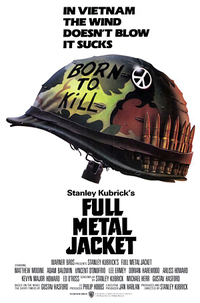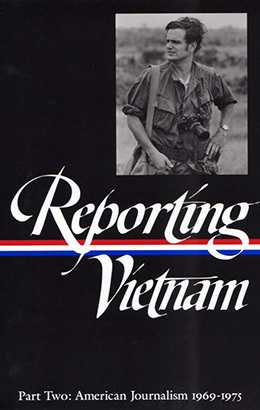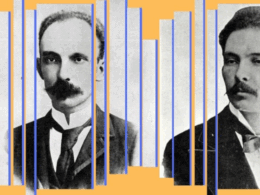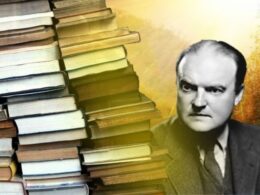By Lary Wallace

Michael Herr thought he was done with Vietnam by the time he first met Stanley Kubrick, at a dinner party at Kubrick’s estate in 1980. He’d just given prolonged and painful birth to Dispatches (1977), his sui generis masterpiece about his time as a correspondent in Vietnam, and had then lent his hand to Francis Ford Coppola for the voiceover narration on Apocalypse Now (1979). But, as Herr recounts in his memoir Kubrick (2000), after their first meeting, the period 1980–83 became “one phone call lasting three years, with interruptions.” This began a twenty-year friendship. Starting in 1985, Herr and Kubrick collaborated on adapting Gustav Hasford’s novel The Short-Timers (1982) into Full Metal Jacket (1987), for which their screenplay would receive an Oscar nomination.
One thing Herr confessed during those early long phone conversations was that he had reviewed Kubrick’s Lolita (1962) during his first writing gig after college, a year-long pro bono stint at The New Leader, where he “had followed Manny Farber . . ., one of the best of all writers on movies.”
[N]aturally, he called someone in New York and had them go down into the catacombs of the New York Public Library to find the review and send it to him. He liked it. I’d given it a rave. I gave it a better review than Stanley himself did.
The review is definitely a rave, as anyone knows who’s gone spelunking after it. It’s a fascinating document, especially considering their later relationship, but it’s not, as Herr would have us and Kubrick believe, the first review of a Kubrick film Herr had ever written. That was his review of Spartacus (1960), which he wrote as a twenty-one-year-old undergrad for Syracuse 10, his college literary magazine. I found it in their archives when seeking out Herr’s apprentice work, and no one, as far as I can find, has ever mentioned this review in print, least of all Herr himself. It provides impressive evidence that Herr was a perceptive and appreciative critic of Kubrick’s films more than twenty years before he ever wrote one.
“A lot of Spartacus is phony and vulgar,” Herr writes in the review’s opening line, but this isn’t nearly as insulting as it at first appears. Kubrick, after all, didn’t write the script, and wasn’t brought onboard until production had already begun. (Kirk Douglas had fired director Anthony Mann after just one week of filming.) Kubrick was more hired hand than auteur, a circumstance Herr was evidently aware of. Listen to the way he attacks Dalton Trumbo’s script, and then consider how, a quarter-century later, he would infuse Full Metal Jacket with the very qualities—authentic dialogue and freedom from political cant—that Spartacus lacked:
Trumbo’s scenario is full of the social-dramatist’s favorite and most offensive dodge: manifesto instead of human speech, the kind of talk that staggers even the best actors and that furthers no dramatic development whatsoever. . . . Trumbo’s vision of Marxism is the most adolescent one imaginable. . . . The journey of the rebelling slaves across Italy is shown to be an extended and unbelievable idyll, their community is naively utopian, and the slaves themselves are so noble and so selfless that after a while you start laughing in the wrong places.
| READ DISPATCHES |
 |
| in Reporting Vietnam: American Journalism 1969–1975 |
Nevertheless, Herr regards Spartacus as “one of the few American pictures of the past year that I really liked. . . . It is cinematically clean, and so well directed, by Stanley Kubrick, that you can often overlook the lack of real drama and be moved just by what you see.” He compliments Kubrick’s “sure eye for landscape,” as well as the “original[ity]” of “the scenes of spectacle.” He expresses “sympathy […] for Kubrick’s failure to get good performance out of all of [the cast]” due to the awkward dialogue.
A little more than a year later, in the final part of the New Leader piece—an omnibus review that took on two movies in addition to Lolita—Herr declares:
There is more class in Lolita than there is in all of Advise and Consent and [The Man Who Shot] Liberty Valance spliced together. I can’t say that Stanley Kubrick has gotten all that much better, only that he is still very good, the best U.S. director working today. A lot of people, in and out of the press, thought that Kubrick had sold out by making Spartacus, and that he would be doing it again by attempting Lolita. But those who watched Spartacus with novocained sensibilities ought to see Lolita as soon as possible. It is one of the most satisfying Hollywood movies since the same director’s Paths of Glory, four years ago.
Where Herr blames Trumbo for Spartacus’s faults, he credits author and screenwriter Vladimir Nabokov with Lolita’s success—too much of it, in fact. Although Nabokov received sole screen credit, Kubrick rewrote his screenplay extensively. Nabokov’s reaction was mixed, as he recounted in the foreword to the version of the screenplay he published twelve years later:
A few days before, at a private screening, I had discovered that Kubrick was a great director, that his Lolita was a first-rate film with magnificent actors, and that only ragged odds and ends of my script had been used. The modifications, the garbling of my best little finds, the omission of entire scenes, the addition of new ones, and all sorts of other changes may not have been sufficient to erase my name from the credit titles but they certainly made the picture as unfaithful to the original script as an American poet’s translation from Rimbaud or Pasternak.
I hasten to add that my present comments should definitely not be construed as reflecting any belated grudge, any high-pitched deprecation of Kubrick’s creative approach. When adapting Lolita to the speaking screen he saw my novel in one way, I saw it in another—that’s all, nor can one deny that infinite fidelity may be an author’s ideal but can prove a producer’s ruin.
So when Herr writes that, “I hate to think of the mess that might have resulted if anyone else had done the screenplay,” or that “Nabokov has more than respected his own brilliance,” or that Nabokov “has gotten most of what was vital about the book into the film,” he doesn’t know that it’s Kubrick he’s actually praising. That’s not his fault; few people could have known then the true provenance of what had made it to the screen.
What’s truly hard to believe is that Kubrick, when he read this review some twenty years later, could have remained silent to Herr on the matter of authorship. But, come to think of it, maybe he thought that best. Maybe he let that one pass, reassured by the proof in Herr’s final lines that he was about to embark on a project with someone who, at the least, considered film a writer’s and director’s medium before it’s an actor’s:
[A]s Quilty, the walking catalogue of depravity, Peter Sellers is superb, an antic serpent handling dialects that range from Cocktailese to Ruritania-Dutch. In fact, it may be that he is too good. Occasionally, in his lunatic soliloquies, he chafes against the fine, firm style that Nabokov and Kubrick have so beautifully achieved.
Maybe, after reading this, Kubrick decided, uncharacteristically, to simply leave well enough alone.
Lary Wallace is a collector of rare Michael Herr materials and contributing editor for The Faster Times.



